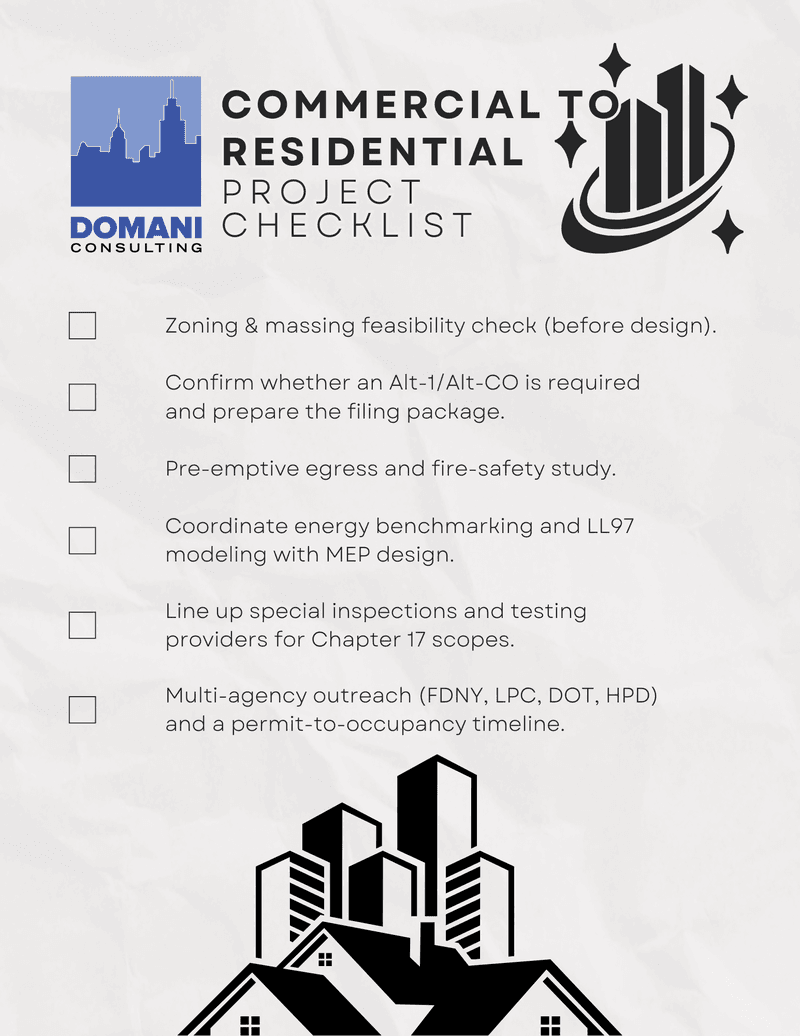UNLOCKED: Commercial-to-Residential Conversions in NYC

Commercial-to-residential (C→R) conversions are more than a renovation — they’re a re-classification of how a building functions under NYC law. That means even when the construction looks straightforward, the permit and approval path can be a maze. Domani Consulting’s specialty is guiding owners, architects and general contractors through that maze as efficiently as possible so projects clear DOB review, pass inspections, and reach legal occupancy.
Short version: no CO, no conversion.
Why conversions are a different animal
Unlike a typical tenant fit-out, a conversion often changes a building’s use group, egress strategy, fire-life safety profile and code obligations. Practically speaking, that triggers an Alteration Type-1 (Alt-1 / Alt CO) filing when the work affects use, egress or requires a new or amended Certificate of Occupancy — the filing that re-defines what a building is allowed to be. Getting that filing and the resulting CO or TCO is the pivotal regulatory step for any C→R project.
Because the shift to residential typically changes energy and occupancy metrics, conversions also intersect with New York City’s energy compliance regime — benchmarking, lighting/sub-metering, and emissions requirements — which must be handled in parallel with permit work rather than as an afterthought. Local Laws such as LL84 (benchmarking), LL88 (lighting and sub-metering) and LL97 (building greenhouse gas limits) are frequently relevant for buildings above the statutory thresholds and should inform early project strategy.
Where Domani Consulting adds measurable value
- Pre-filing due diligence & zoning feasibility
- Early zoning and massing analysis to confirm whether residential use is allowable and what special triggers (BSA, LPC, HPD) may be needed. This reduces surprises during DOB plan exam.
- Alt-1 / Alt-CO package preparation & submission
- Assemble coordinated permit sets (architectural, egress, fire protection, MEP, energy documentation) and file the correct application type so DOB routes the review properly and avoids re-categorization delays. Alt-1 filings are the right path when use/egress/occupancy change.
- Proactive plan-exam management & DOB interface
- Track plan examiner comments daily, prepare consolidated responses and revised drawings, and negotiate practical code interpretations — all with the aim of shortening review cycles and preventing repetitive resubmissions.
- Multi-agency coordination
- Coordinate with FDNY (fire protection & life-safety), LPC (landmarks), DOT/DEP (sidewalks/vaults/curbcuts) and HPD (for affordable units), so filings and approvals proceed in parallel rather than sequentially.
- Inspection scheduling & closure (TCO/CO support)
- Schedule required DOB inspections, chase signoffs, compile final documentation and push for TCO or final CO issuance so units can be leased or occupied legally.
- Strategic sequencing with energy compliance teams
- Because benchmarking and LL97 strategy affect MEP scope, Domani coordinates filing timelines with energy consultants so system upgrades and meter work dovetail into the permit path rather than cause rework later.
Common regulatory pinch points (and how we avoid them)
- Egress & life-safety changes — conversions commonly alter exit pathways and occupancy loads; early egress studies and staged design choices avoid last-minute redesigns.
- Accessibility & Fair Housing requirements — moving to residential invokes Chapter 11 accessibility requirements and Fair Housing considerations that affect common areas and a share of units; early engagement prevents costly retrofits.
- Special inspections & material testing — structural changes, new fire-rated assemblies, or façade work triggers Chapter 17 special inspections and third-party testing; Domani plans for those inspections in the schedule and budget so there are no surprises.
- Energy compliance coupling — LL84/LL88/LL97 work can alter mechanical scope and sequencing; we make sure energy deliverables are in the permit package where required.
A practical, owner-ready checklist

Closing: why early expediting wins the calendar and the budget
Owners who bring in permit expeditors early convert risk into milestones. When permit strategy (Alt-1 logic), zoning constraints, energy compliance and special-inspection coordination are baked into the schedule from day one, the project spends less calendar time in plan exam and more time delivering rentable units. Domani’s client playbook is simple: identify regulatory triggers early, bundle deliverables smartly, and maintain constant DOB/agency pressure until sign-offs are in hand.
